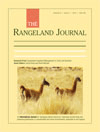
RANGELAND JOURNAL
Scope & Guideline
Connecting Scholars in Rangeland Science
Introduction
Aims and Scopes
- Sustainable Rangeland Management:
The journal emphasizes research aimed at sustainable practices in grazing and land management, exploring how these practices can enhance ecosystem health while meeting agricultural production needs. - Biodiversity and Ecosystem Services:
A core area of focus is the relationship between rangeland management and biodiversity, including how management practices can support ecosystem services such as carbon sequestration and soil health. - Impact of Climate Change:
Research that investigates the effects of climate change on rangelands, including shifts in vegetation, soil properties, and water resources, is a consistent theme in the journal's publications. - Use of Remote Sensing and Technology:
The journal promotes the application of remote sensing, GIS, and other technological advances to monitor and manage rangeland conditions, providing innovative methodologies for data collection and analysis. - Indigenous Knowledge and Practices:
A unique contribution of the journal is its focus on integrating Indigenous knowledge and practices in rangeland management, reflecting the cultural significance of these lands.
Trending and Emerging
- Nature-Based Solutions:
Recent publications have increasingly focused on nature-based solutions, particularly in the context of Indigenous land management, exploring how these approaches can address environmental challenges and enhance ecosystem resilience. - Remote Sensing Applications:
There is a growing trend in utilizing remote sensing technologies for monitoring and managing rangelands, indicating an increased reliance on data-driven methodologies to assess land health and productivity. - Climate Resilience and Adaptation Strategies:
Research addressing climate resilience has gained traction, focusing on adaptive management strategies that can help rangelands cope with the impacts of climate change, such as drought and altered precipitation patterns. - Policy and Governance Frameworks:
There is an emerging emphasis on the analysis of policy frameworks affecting rangeland management, highlighting the importance of governance structures in facilitating sustainable practices and addressing stakeholder needs. - Integration of Social Dynamics in Management:
Studies are increasingly considering social-identity dynamics and community engagement in rangeland management, reflecting a growing recognition of the importance of social factors in achieving effective management outcomes.
Declining or Waning
- Traditional Grazing Practices:
There has been a noticeable decrease in research focused solely on traditional grazing practices without considering innovative or sustainable adaptations, suggesting a shift toward more progressive management strategies. - Historical Land Use Studies:
Research centered on historical land use practices has waned, possibly indicating a greater emphasis on current management practices and their immediate impacts rather than retrospective analyses. - Purely Economic Perspectives:
Papers focusing solely on the economic aspects of rangeland management, without incorporating environmental or social dimensions, appear to be declining, reflecting a broader trend toward integrated approaches.
Similar Journals
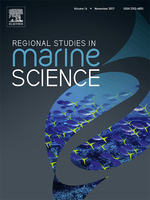
Regional Studies in Marine Science
Connecting Research to Coastal ConservationRegional Studies in Marine Science, published by Elsevier, is a leading academic journal dedicated to advancing the understanding of marine ecosystems and their regional dynamics since its inception in 2015. With an ISSN of 2352-4855, this journal is indexed in Scopus and has achieved impressive ranking quartiles, notably Q2 in categories like Animal Science and Zoology, and Ecology, showcasing its relevance and impact in these fields. As of 2023, it ranks in the 79th percentile for Animal Science and Zoology, reflecting its significant contribution to academic discourse. While the journal operates under a traditional access model, its rigorous peer-review process ensures the publication of high-quality research that is crucial for understanding ecological interactions and fostering sustainable practices within marine environments. Researchers, professionals, and students alike will find this journal an invaluable resource for the latest findings and advancements in marine science, as it strives to bridge the gap between research and practical application at regional and global levels.
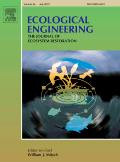
ECOLOGICAL ENGINEERING
Connecting research and practice for a sustainable world.ECOLOGICAL ENGINEERING, published by Elsevier in the Netherlands, is a leading journal dedicated to advancing the field of environmental engineering and sustainable development. With an impressive impact factor and recognized as Q1 in multiple categories including Environmental Engineering, Management, Monitoring, Policy and Law, as well as Nature and Landscape Conservation, this journal stands at the forefront of environmental science research. It ranks among the top publications in its fields according to Scopus, reinforcing its significance with a notable position within the 90th percentile for Nature and Landscape Conservation. ECOLOGICAL ENGINEERING encourages open discourse and dissemination of innovative practices aimed at addressing contemporary ecological challenges, making it an essential resource for researchers, professionals, and students committed to sustainable practices and environmental stewardship. The journal’s comprehensive scope includes ecological restoration, habitat management, and policy implementation, ensuring a broad spectrum of relevant topics for its readership.

Carbon Balance and Management
Connecting researchers to combat climate challenges.Carbon Balance and Management is a prestigious open-access journal published by BMC, focusing on the critical areas of carbon management, environmental science, and global change. Since its inception in 2006, the journal has contributed significantly to advancing research within the realms of Earth and Planetary Sciences, Environmental Management, and Policy, gaining recognition for its high-impact studies, as evidenced by its Q1 status in multiple categories, including Earth and Planetary Sciences and Management, Monitoring, Policy and Law. With an impressive ranking within the 91st percentile among Earth and Planetary Sciences journals, it stands as a vital resource for researchers, professionals, and students dedicated to understanding and addressing the complexities of carbon balance and sustainability. The journal embraces a broad scope of interdisciplinary research, catalyzing impactful solutions to pressing environmental challenges and fostering collaboration across scientific communities. The commitment to open access allows for wider dissemination of knowledge, ensuring that critical findings reach a diverse audience globally. Whether you're aiming to contribute original research, review existing literature, or simply stay informed, Carbon Balance and Management serves as an essential platform for fostering advancements in carbon management strategies and climate policy.
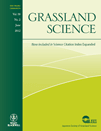
GRASSLAND SCIENCE
Transforming understanding of grassland ecosystems.GRASSLAND SCIENCE is a highly regarded journal published by Wiley that spans a diverse range of disciplines related to the study and management of grasslands. With its ISSN 1744-6961 and E-ISSN 1744-697X, this publication has established a firm footing within the academic community since its inception in 2009. Notably positioned in the Q2 quartile for Agronomy and Crop Science and Q3 quartiles for Ecology, Evolution, Behavior and Systematics and Plant Science, GRASSLAND SCIENCE aims to advance the understanding and sustainable management of grassland ecosystems, addressing critical issues such as biodiversity, land use, and climate change. Although the journal does not currently offer an open-access model, it provides comprehensive insights and research findings that are invaluable to researchers, professionals, and students engaged in agronomy, ecology, and environmental studies. With a commitment to fostering collaboration and innovation, GRASSLAND SCIENCE is a vital resource for those dedicated to enhancing the ecological and agricultural significance of grasslands worldwide.

Sylwan
Connecting science and practice in sustainable forest management.Sylwan, published by POLSKIE TOWARZYSTWO LESNE, is a key journal in the field of forestry, focusing on the science and practice of sustainable forest management and conservation. Operating since 1979 and releasing issues periodically, including those from 2011 to 2018 and from 2020 to 2024, this journal plays a vital role in disseminating research and advances in forestry practices particularly relevant to Poland and the broader European context. While currently not offering open access options, Sylwan maintains a Q4 ranking in the forestry category according to the Scopus database, highlighting its dedicated niche within the scientific community. The journal serves as an essential resource for researchers, professionals, and students seeking to enhance their understanding of forestry issues in a global and ecological framework. With a commitment to promoting innovative research, Sylwan supports the ongoing dialogue on forestry management and policies, ultimately contributing to the sustainable development of forest resources.
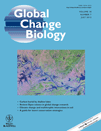
GLOBAL CHANGE BIOLOGY
Connecting Science to Policy in a Changing WorldGLOBAL CHANGE BIOLOGY, published by Wiley, is a leading journal dedicated to advancing the scientific understanding of the relationships between biological systems and global environmental changes. With an impressive impact factor placing it in the Q1 category across multiple disciplines—including Ecology, Environmental Chemistry, and Global and Planetary Change—this journal is essential for researchers, professionals, and students aiming to stay at the forefront of this dynamic field. The journal has a rich history since its inception in 1995, continually providing a platform for high-quality research that informs policy and management practices worldwide. Although it is not open access, the journal remains a valuable resource for those committed to exploring the complexities of ecological and environmental change. With a Scopus ranking of #3 in Global and Planetary Change and #6 in both Ecology and Environmental Chemistry, GLOBAL CHANGE BIOLOGY continues to shape the dialogue on the pressing environmental challenges of our time.
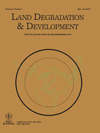
LAND DEGRADATION & DEVELOPMENT
Innovating pathways to combat land degradation.LAND DEGRADATION & DEVELOPMENT is a premier academic journal published by WILEY that has been at the forefront of research on the critical issues surrounding land degradation since its inception in 1989. With an impressive impact factor and ranked in the Q1 category across multiple fields including Development, Environmental Chemistry, Environmental Science, and Soil Science, this journal serves as an essential resource for scholars and professionals dedicated to sustainable land management and environmental conservation. Although it currently does not provide open access, its rigorous peer-review process ensures the publication of high-quality, impactful research that addresses vital environmental challenges. The journal aims to foster interdisciplinary collaboration, promote innovative solutions, and disseminate knowledge that not only informs policy but also empowers communities to combat land degradation effectively. Researchers, professionals, and students alike will find the insights and findings published in LAND DEGRADATION & DEVELOPMENT invaluable for advancing their understanding and practices within this critical field.

Journal of Forest Research
Advancing sustainable forestry for a thriving planet.Welcome to the Journal of Forest Research, a pioneering publication dedicated to advancing the field of forestry and sustainable ecosystem management. Published by Taylor & Francis Ltd and boasting an impressive Q2 ranking within its category, this journal highlights significant research contributions and innovative practices in forest science. With an ISSN of 1341-6979 and E-ISSN of 1610-7403, the journal spans a fruitful history from 1996 and continues to be an influential platform up to 2024. The Scopus rank places it at an esteemed #55 out of 174 in the realm of Agricultural and Biological Sciences, reflecting its high impact within the community. While this journal is not open access, it offers targeted content for researchers, professionals, and students seeking to deepen their understanding of forest ecosystems and promote sustainable practices. Join us in exploring the intricate relationship between society and forests, and contribute to a crucial dialogue on environmental stewardship.
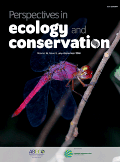
Perspectives in Ecology and Conservation
Transforming conservation science through rigorous analysis.Perspectives in Ecology and Conservation, published by Elsevier Science Ltd, is a leading academic journal dedicated to advancing the fields of ecology, conservation, and environmental management. With a Q1 ranking in multiple categories, including Ecology, Management, Monitoring, Policy and Law, and Nature and Landscape Conservation, this journal boasts an impressive standing among its peers, making it essential reading for researchers and professionals. Since its inception in 2017 and running through 2024, it aims to provide innovative perspectives and critical analyses that enhance our understanding and practices in conservation science. The journal is accessible through open access options, facilitating broader dissemination of knowledge. Its commitment to addressing contemporary ecological challenges reinforces its importance in the academic community, promoting sustainable practices and informed policy-making in the face of urgent environmental issues.

Journal of Forest Science
Exploring the intersection of ecology and forestry.Journal of Forest Science, published by the Czech Academy Agricultural Sciences, serves as a pivotal resource in the field of forestry and soil science. With its ISSN 1212-4834 and E-ISSN 1805-935X, this Open Access journal has been delivering insightful research since 2003, making knowledge freely available to researchers and practitioners globally. Hailing from the Czech Republic, the journal has established a notable impact within the academic community, as evidenced by its placements in the Q2 quartile for Forestry and Q3 for Soil Science according to the latest rankings. This positions the Journal of Forest Science favorably within academic discourse, ranking #73 out of 174 in Forestry and #84 out of 159 in Soil Science on Scopus, placing it at the 58th and 47th percentiles respectively. Covering a wide range of topics that intersect with environmental sustainability, forest management, and ecological research, the journal aims to foster innovation and collaboration within the scientific community. Researchers, professionals, and students can access published articles easily, bolstering the advancement of knowledge in forest science and its related disciplines.